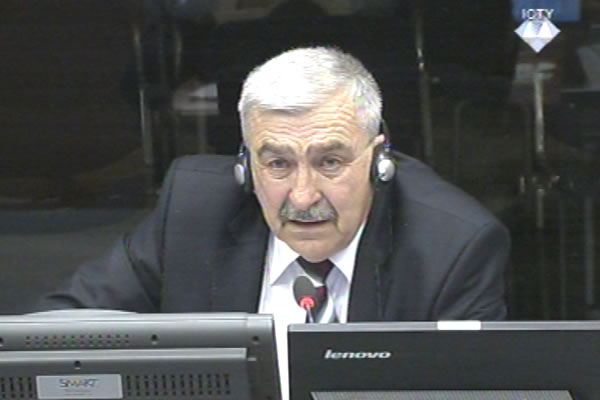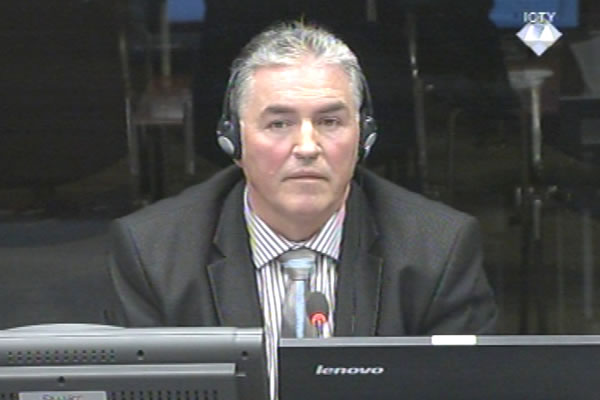Home
KARADZIC’S WITNESSES TOOK ACTIVE PART IN PRIJEDOR EVENTS
In his evidence in Karadzic’s defense, Zdravko Torbica, a traffic policeman, defended himself against the allegations that he had helped the deportation of non-Serb civilians from Prijedor, escorting the transports taking the dead bodies to the Tomasica mine and beating prisoners in the police station. Member of the municipal Crisis Staff Bosko Mandic explained the role of that body in the detention of non-Serbs from Prijedor in the prison camps and their expulsion
 Zdravko Torbica, witness at the Radovan Karadzic trial
Zdravko Torbica, witness at the Radovan Karadzic trial After Radovan Karadzic completed the examination of a former investigator from the Keraterm prison camp, he called two municipal officials from Prijedor to testify in his defense.Both Zdravko Torbica and Bosko Mandic tried hard to paint a rosy picture of the situation in the Serb-controlled municipality. Since Torbica and Mandic participated in the events related to the war crimes, they tried to protect both the accused and themselves.
During the war, Zdravko Torbica worked in the traffic police in Prijedor. One of his tasks was securing the convoys ‘whose destinations were set by the municipal authorities’, Torbica said in the examination-in-chief. Those were usually convoys of buses with non-Serb civilians leaving Prijedor on board. Torbica claimed that he didn’t know whether those people had been forced to leave and he wasn’t interested. Torbica did his best to complete the task he was given: to escort the refugees from the territory under Serb control.
In the cross-examination, prosecutor Amir Zec put it to the witness that he and the traffic police as a whole had thus participated in the deportation. Also, they secured convoys carrying the dead bodies of the Bosniaks and Croats from Prijedor from the execution sites to the recently discovered mass grave in the Tomasica mine. In his defense, Torbica said that he heard about the mass grave only when the media reported the discovery. Torbica categorically claimed he didn’t escort the trucks with the bodies, but he could not be certain about whether other traffic police officers had done that or not.
The prosecutor put it to him that before the non-Serbs from Prijedor were taken to the prison camps, they were often beaten in the police station where Torbica worked. Torbica replied that his office was on the ‘third floor’ in the northern wing of the building. He could not know about the goings-on downstairs and couldn’t see who was taken in through the entrance, which was situated in the southern wing, Torbica explained. Also, Torbica contradicted the testimony of a prosecution witness who alleged that Torbica had hit him in the head and abdomen in the police station. ‘I simply am not that kind of person, I am a professional police officer’, said Torbica.
During the war, Bosko Mandic was a member of the highest executive body in Prijedor: he was the vice president of the Executive Board. In 1992, the Executive Board was transformed into the Crisis Staff. Mandic stated that the non-Serbs left Prijedor voluntarily because they felt ‘unsafe, economically and in general’. They waited to be transferred to third countries in Trnopolje, an open ‘collection center’. On the other hand, those who had in any way participated in the armed conflict were taken to the ‘investigation center’ in Omarska, Mandic explained.
In the cross-examination, prosecutor Gustafson showed a conclusion of the Prijedor Crisis Staff from July 1992, prohibiting ‘the release of individuals’ from Omarska and Keraterm, but also from Trnopolje – despite Mandic’s claim that it was an open detention center. The witness replied that it was a temporary measure to protect the civilians who had sought shelter there from the risks they would have faced if released. ‘It was better for them to be in Trnopolje than to be killed outside by some fool in a uniform’, Mandic said. Mandic added that Serbs, including himself, were afraid of the Serb extremists. Mandic was unable to explain why then no Serb civilians had sought shelter in Trnopolje.
When it was put to him that some of the Muslims and Croats in Omarska had nothing to do with fighting, the witness replied that they were people that ‘queued up, waiting for someone to be killed to take their gun’ because there were not enough arms. Speaking about the legal instruments adopted by the municipality to allow the seizure of the Muslim and Croat refugees’ property (the property was then given to local Serbs), Mandic said this was done in a bid to ‘protect and safeguard’ the apartments and businesses until their owners returned.
The trial of Radovan Karadzic continues tomorrow with the cross-examination of Ljubisa Beara. The former chief of security in the VRS Main Staff was sentenced to life for his role in the Srebrenica genocide. Beara began his testimony in December 2013.
Photos
Linked Reports
- Case : Karadzic
- 2014-01-20 KVOCKA DENIES CRIMES IN OMARSKA
- 2014-01-17 AVENGER OR JUST OBSERVER
- 2014-01-16 ‘VOLUNTARY DEPORTATION’
- 2014-01-22 BEARA BLAMES RS POLICE FOR SREBRENICA
- 2014-01-22 MUSLIMS AND SERBS: ‘BROTHERS BY BLOOD, ENEMIES BY FAITH’
- 2014-01-22 WITNESS CLAIMS HE DIDN’T KNOW HIS COLLEAGUE WAS KILLED IN A CAMP 22 YEARS AGO

